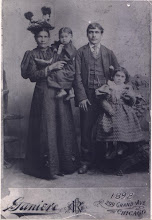Another history lesson… As I was learning about Southern Italian folklore, I discovered a festival/reenactment celebrated every summer near Calvello/Potenza. The reenactment is of life in the 1800's and there is a big show at the end, with fireworks, that celebrates the contribution of Brigands to the Italian Unification. I was shocked and disturbed by this, because, up until this point, all I had read was of brigands kidnapping and ransoming people, killing others, and plundering even poor farmers. It certainly didn't seem like Robin Hood. Then, I thought, maybe they are celebrating the contribution of the Carbonari (the political secret society which was often more like bandits than patriots).
But, as I read more, I found that brigandage has been a part of Southern Italian society since pre-roman times: the men of the mountains were the terror of the men of the plains (the Romans). In those times a shepherd might have tended their flock by day and steal those of neighbors in the valleys by night. The struggle between Rome and the Samnites (Lucanians were Samnites). At one point Romans trapped two thousand bandits in a cave and burned them all. The constant attack of brigands upon townspeople, led to those towns wanting to seek shelter under the Roman republic.. Capua, a wealthy city, was so frequently assaulted by armed shepherds of the Appenines, that it asked protection of Rome.
On the other side, these same mountaineers sometimes allied themselves with the Romans, collecting as rewards for their services, the plunder of cities conquered and taken into the Roman republic.
This practice continued so, when there was a war (or in-fighting) brigands actually were sort of mercenaries; and when there wasn't they would supplement their incomes with ransoms, thieving etc. The Bourbon's hired brigands, and so did Garibaldi… I think the pope did as well in the papal states. So, brigandage was an accepted sort of profession… not just in Southern Italy, but in much of Europe. There is a funny story of an Italian tax collector asking for taxes from a brigand… who replied to the effect was that business had been bad, but if he would let him go, he would go rob someone right away. He was released as taxes were more important than civil protection.
After the 1860 revolution, brigandage continued, and in fact, worsened because there was basically a civil war. Although Victorio Emmanuel was made king, the Bourbons tried to create subversion and to regain power with brigands and others who supported their return. **
The new kingdom eventually made it a priority to squash brigandage, but as the problems of the south continued to be ignored by the government… brigands became mobsters. Many an immigrant said that they had no choice but to immigrate, starve or become a brigand.
Right after I posted this, Lucio Ferri wrote to me that he had found another infamous DeGrazia from Calvello:.
Francesco De Grazia, son of Leonardo Antonio of Calvello was suited by a military court for being a Brigante.1863. He was supposed to be a member of the gang of the chief bandit Scoppettiello. So, now I have yet another DeGrazia to research...
----------------
*** about the Bourbon return… Luccio says that there is still a group of citizens who support the return of the Bourban dynasty; and, in fact, when in Caserta, I was reading several local and Naples papers, and they were all about a Bourbon princess (I think in Austria?)… and there were several articles about the Kingdom of the Two Sicelies. I guess its not ancient history at all.






No comments:
Post a Comment